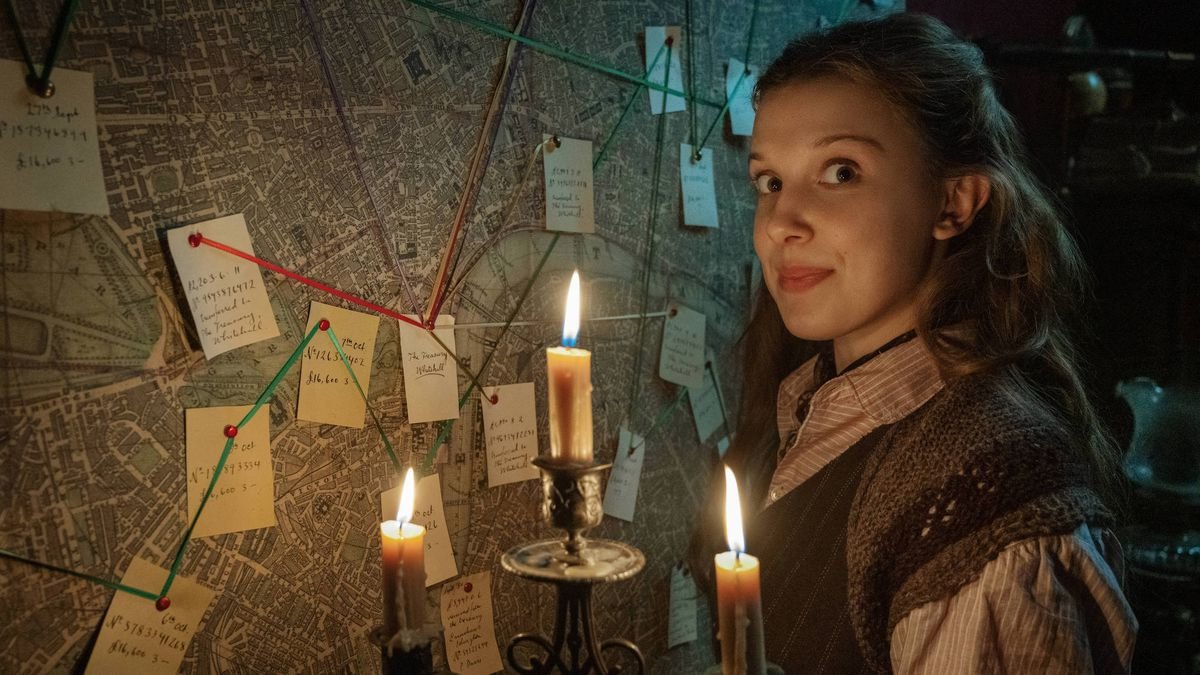Enola Holmes 2

This sequel is arguably even more enjoyable than 2020’s first instalment in this period comedy/mystery thriller series, due in part to the filmmakers’ decision to tell an original story rather than adapting another from the series of Young Adult novels, which provides the opportunity for a more focused plot and a more satisfying central mystery.
Premise: Following the events of the first film. Enola Holmes (Millie Bobby Brown) has moved to London and set up her own detective agency, but she finds it impossible to escape the shadow of her famous older brother, Sherlock (Henry Cavill). Deciding to take a case that no one else is interested in, Enola agrees to help a young factory girl find her missing sister.
Review:
I’ve never read any of Nancy Springer’s Enola Holmes Mysteries novels, so I can only judge these films on their own merits, rather than as faithful (or otherwise) adaptations. That said, as much as I enjoyed 2020’s first Enola Holmes movie, I couldn’t help but feel that the film’s shortcomings – namely a plot that was all over the place, and a central mystery that was a little underwhelming – could be traced back to the film’s attempt to squeeze in everything from the first novel.
This sequel is happily freed from any such shackles, as instead of adapting the next in the series of novels, award-winning screenwriter Jack Thorne has come up with an original story that weaves the fictional characters into real-life events in 1888 London. So whereas the first film struggled to maintain its attention on any one plot thread – endlessly shifting between Enola’s search for her mother, the mystery of the missing Viscount, and Mycroft’s determination to send Enola to boarding school – Enola Holmes 2 is a much more focused movie.
“…an engaging mystery that also cleverly weaves real historical events into the plot…”
This time, the central mystery revolves around the disappearance of Sarah Chapman, a factory girl working in one of London’s match factories. One of the things that works so well about this original storyline is that it’s not only an engaging mystery in its own right (which can’t quite be said of the mystery from the first movie), but it also cleverly weaves real historical events into the plot in a way which (if you’re like me and you weren’t already familiar with this period of history) was both fascinating and unexpected.
This sequel also continues one of the most interesting elements from the first movie, and that’s the series’ social commentary. The first film touched on issues like social injustice, feminism, equality and universal suffrage, and (without getting into spoilers on specifics), the sequel does so as well, addressing everything from the institutional misogyny and racism of the time, to labour reform and workers’ rights. As is always (sadly) the case with films like this, the more these issues are highlighted in a “period” film, the more we realise just how little progress has been made in the real world in the last 134 years.
“…this is still very much Millie Bobby Brown’s movie…”
While the plot to the sequel is actually an improvement over the first film, everything else that made the first film so much fun is also back, and in some cases, expanded. Like the first film, this is still very much Millie Bobby Brown’s movie, and she once again makes the lead character engaging and entertaining, without every becoming too know-it-all or unrelatable. If, like me, you felt that her scenes with Henry Cavill as Sherlock were one of the highlights of the first film, you’ll be happy to know that the sequel builds on this even further and gives them more scenes together (while also managing to avoid the trap of making this feel like a Sherlock Holmes story where Enola is just the sidekick).
Returning cast members from the first film include Louis Partridge as Tewkesbury (who fulfils a more overtly love-interest role in this sequel, albeit without losing any of the charm and humility that made the character such a breath of fresh air in the first film), Helena Bonham Carter as Enola's mother (following her surprise appearance in person at the end of the first film), and Adeel Akhtar as Inspector Lestrade (who this time around has more of a comic relief role, without the more sinister undertones that were present in some of his scenes in the first movie). Susie Wokoma is also back as Edith, although in real terms, she has little more than a cameo in both movies (albeit memorable ones).
“…benefits from a tighter plot & more focused structure…”
This time they’re also joined by newcomers David Thewlis as the sinister Grail, David Westhead as factory owner Henry Lyon, with Gabriel Tierney as his son William, and Tim McMullan as Chancellor of the Exchequer Charles McIntyre, with Sharon Duncan-Brewster as his assistant Mira.
If you’re a fan of the first film, chances are you’re going to enjoy this sequel, possibly even more than the first movie. But the tighter plot and more focused structure mean that even if you were left a little underwhelmed by the first film, there’s a chance you may get more out of this sequel. Ultimately, although this film series is still primarily aimed at the Young Adult audience, there’s plenty to keep older (and younger) viewers engaged thanks to the film’s great cast, fun tone, brisk pace and timely social commentary. And based on the first two instalments, I’d happily tune into a third movie in another couple of years.







